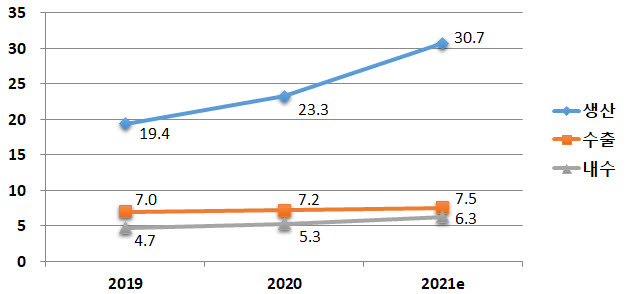It is predicted that the production and export of secondary batteries in Korea, which has increased for the last 5 consecutive years, will increase significantly this year. The government and the battery industry predicted that this year’s secondary battery production will reach a record high of 31 trillion won and exports of 7 billion dollars.
![Korea's secondary battery export trend. (Unit: trillion won) [자료:산업통상자원부]](https://i0.wp.com/img.etnews.com/photonews/2101/1375693_20210118075816_622_0001.jpg?w=560&ssl=1)
The Ministry of Trade, Industry and Energy and the Korea Battery Industry Association announced on the 18th that despite the deteriorating economic situation due to Corona 19, major indicators such as secondary battery production, export, and domestic demand rose significantly last year.
Last year, the global secondary battery production scale of domestic companies was 22.3 trillion won (lithium ion battery 20 trillion 600 billion won, etc.), a 20% increase from 1.94 trillion won in 2019. Exports increased for 5 consecutive years to 7.2 trillion won (6.57,000 dollars). The number of lithium-ion batteries for electric vehicles increased by more than 10%, driving the overall increase in exports. Domestic demand also increased by 11.6% from the previous year to 5.7 trillion won. This is due to the increased demand for lithium-ion batteries for electric vehicles as the domestic electric vehicle production increases.
The global market share of major domestic secondary battery manufacturers such as LG Energy Solution, Samsung SDI, and SK Innovation has also improved significantly. As of November last year, the combined market share of the three battery companies was 34%, more than doubled from 16% in 2019.
The Ministry of Industry predicted that this year’s battery production will increase by 32% to 31 trillion won, and exports will also increase 5.7% to 7 billion dollars, breaking the highest. The domestic market for secondary batteries is expected to expand 24.1% to 5 trillion won this year thanks to the launch of EV-specific platforms and new models by Hyundai Motors and Kia Motors.
The reason for this year’s production and export expansion forecast is that demand for secondary batteries is expected to increase significantly as downstream industries such as electric vehicles and energy storage systems (ESS) grow due to eco-friendly policies of major countries such as Europe, the United States, and China.
In response to the expansion of the secondary battery market, the Ministry of Industry predicted that competition is heating up, such as expanding competitive facility investment and entering the market of new companies, but for the time being, it is expected that the system centered on the top six companies in Korea, China, and Japan will continue.
At the same time, he expressed his willingness to foster the secondary battery industry, which has solidified its position as the food industry of the future following system semiconductors, bio health, and future cars. It will support the domestic rechargeable battery industry to grow significantly based on the expansion of global electric vehicle demand, and to sustain the growth trend by increasing the market share of domestic companies.

Vice Minister of Trade, Industry and Energy Park Jin-gyu visited Misomsystech, a secondary battery solution company, and encouraged employees. Misumsystech is producing secondary battery battery management system (BMS) and battery packs, starting with secondary battery inspection equipment. It has recently completed the development of a battery pack for an electric motorcycle battery replacement platform.
Deputy Minister Park said, “As the demand for various fields including mobility, home appliances, robots, drones, etc. expands, the rechargeable battery industry is expected to grow further.” “The Ministry of Industry, We will not spare full support.”
Reporter Ham Bong-gyun [email protected]
